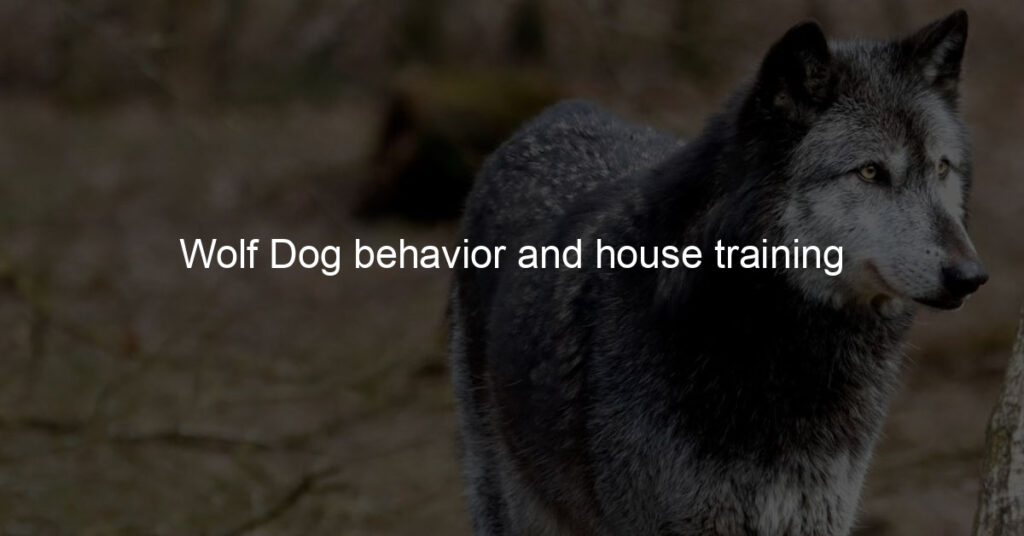Are you thinking about owning a wolf-dog, or have you recently taken in one? If so, then the topic of understanding and managing their behavior is something that’s likely already crossed your mind. Owning a wolf dog can be a unique challenge – after all, they come with an uncontrollable wild side!
But don’t worry; with proper training and guidance, it’s possible to manage their behavior while still letting them retain some of those strong instincts they were bred for. In this blog post, we’ll talk about how to handle house training, along with other aspects of behavior management when it comes to owning a wolf dog – this way you can give your new companion the best home life possible.
What is the Behaviour of a wolf-dog?
Wolf Dogs have both lupine and canine traits, making them quite interesting to interact with since each animal is so unique. While some are more wolf-like and reserved, others are more domesticated in their behavior, feeling comfortable around humans and even showing affection to their owners.
Generally, they’re intelligent animals who need plenty of physical activity and exercise, as all dogs do. If interacted with regularly but also given the freedom to roam and explore outdoors, wolf dogs will exhibit a behavioral balance that can make them fascinating companions for life.
How do you house-train a wolf dog?
Training a wolf-dog, or hybrid can be a challenging but rewarding experience. First off, you’ll want to make sure they have access to lots of outdoor exercise and space to burn off their energy. Furthermore, as with any pet, it’s best to start house training early.
Have a designated spot for them to go and take them there regularly so they learn the routine. Encourage positive results with treats or verbal praise when they do something correctly. Of course, there will be mistakes along the way—just be firm and consistent in your instruction so that eventually, your wolf hybrid becomes comfortable with all the rules of their new home!
Do wolf dogs protect their owners?
Wolf dogs are an incredibly unique breed, as they’re a part wolf and therefore share many of the physical and behavioral traits of their wild relatives. As far as protection goes, there is much debate on whether wolf dogs serve as good guardians for their owners.
Owners would be wise to understand that wolf dogs are still wild animals and they may display unpredictable behaviors in certain circumstances. While certain wolf dog breeds may be more protective over their humans than others, precaution should always be taken when bringing one into the household.
How do wolf dogs show affection?
Wolf dogs are beloved for their loyal companionship and affectionate personalities. Although they aren’t usually as expressive with their affections as some other more domesticated breeds, wolf dogs show their love through simple gestures.
A sign of a wolf dog’s affection is often as subtle as leaning into you when being petted or lying against your side when sitting on the couch. They also show their appreciation through their eyes; wolf dogs typically have a gentle but knowing gaze that communicates their feelings of intimacy and gratitude.
Other expressions of love may include perking up the ears while hearing your voice, offering greetings such as yawning or licking around your mouth or chin, and reacting eagerly to treats or rewards. When it comes to expressing love, these canines opt for quality over quantity!
Conclusion: Wolf Dog behavior and house training
It is important to remember that all dogs have different temperaments and personalities, so it is very possible to house-train a wolf dog. However, their wild nature and strong instinct can make training more difficult.
Positive reinforcement, patience, and consistency are key elements of successful training with any type of animal. In addition to spending time socializing your wolf dog puppy and reinforcing appropriate behavior, being aware of its diet, exercise needs, and development stages is crucial for successful house training them.
Taking the time to understand the delicate balance between punishment and reward will help keep your furry four-legged family member both happy and healthy. Best of luck on your and your wolf dog’s journey together – we are sure it will be an adventure!








